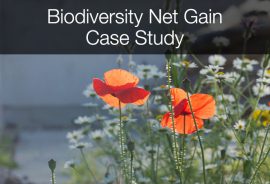The project
Cannon Park is a redevelopment of the existing car park on the Land off De Montfort Way in Coventry. The project involves the construction of a large purpose-built student accommodation development adjacent to Warwick University, with generous amenities, and a new multi-storey car park, landscaping enhancements, new pedestrian crossing and other public realm improvements.
The task
Semi-natural habitat present within the site boundary needed to be removed to accommodate the new building. This brought about the challenge of ensuring that a measurable biodiversity net gain was achieved whilst losing areas of high ecological value.
The challenge was to achieve a net gain in line with local and national planning policy and best practice, whilst still meeting the client’s overall aspirations for the project.
The solution
The Ecology Consultancy worked closely with both the developer and their planning team from an early stage in the process to promote the delivery of measurable net gains in biodiversity. Combining data collected from field surveys with expert knowledge and judgement, our Midlands office consultants proposed a number of options to inform the evolution of the detailed design for the site.
The potential for net gains was ultimately achieved through the inclusion of a variety of green infrastructure elements alongside additional habitat enhancements, specifically targeting bats, birds, reptiles, badger and other small mammals as follows:
- Retention and augmentation of existing native hedgerows;
- Protection of existing boundary trees, management of existing stock and under-planting of native species to promote habitat creation in addition to supplementary native tree planting;
- Planting of new wildflower grassland areas throughout the site;
- Wildflower green roof and feature living wall to provide additional habitat opportunities and enable sustainable retention of rainwater; and
- Provision of bird and bat boxes.
To ensure that the predicted net gains were realised, our experts conceived a long-term management plan, which sets out a schedule for regular monitoring and associated maintenance of these habitats.
Outcome
The incorporation of efficient and measurable biodiversity net gain predictions into the design allowed for the development to be granted full planning permission.
Furthermore, we worked closely with the client to ensured that biodiversity was integrated into the designs without the need for compromise on their aspirations for the scheme.
Client Testimonial
Ben MacPhee, Development Manager, MRP, March 2020: “We are very satisfied with the way The Ecology consultancy met our demands. They communicated effectively with our design team, providing relevant and expert information allowing us to design the masterplan in line with our initial vision, whilst not only conserving or restoring, but enhancing biodiversity on site.”



